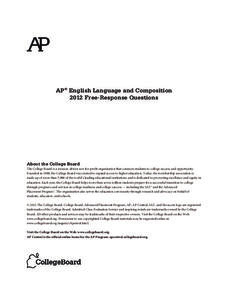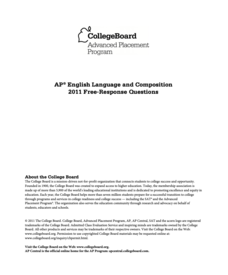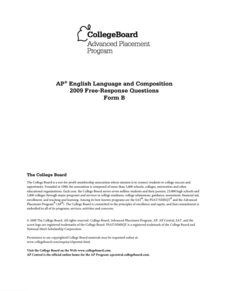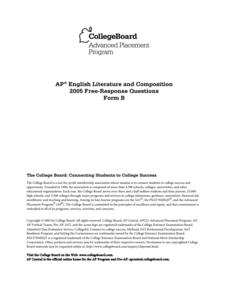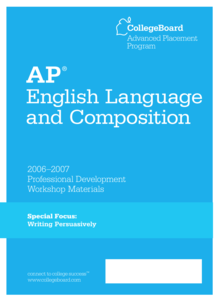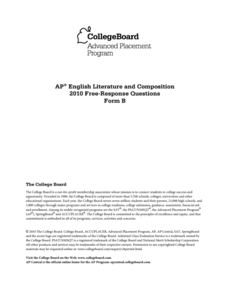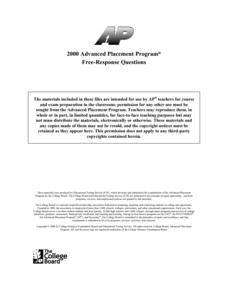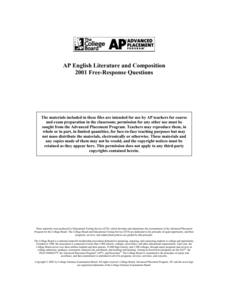College Board
2012 AP® English Language and Composition Free-Response Questions
Neither rain nor snow nor heat nor gloom may keep postal workers from delivering the mail, but is their livelihood sustainable? A question about the USPS makes up one of the three items in a series of free-response questions from the...
College Board
2016 AP® English Language and Composition Free-Response Questions
When it comes to testing, practice makes perfect. A set of free-response questions from the AP® English Language and Composition exam help writers prepare for the test. Three different prompts cover topics such as monolingual English...
College Board
2015 AP® English Language and Composition Free-Response Questions
Many schools have honor codes, but scholars do not always choose to follow them. As part of a series of free-response questions from the AP® English Language and Composition Exam, learners discuss the benefits or disadvantages of honor...
College Board
2011 AP® English Language and Composition Free-Response Questions
Mammals can be carnivores, omnivores, and herbivores, but what about locavores? A set of free-response questions from the 2011 AP® English Language and Composition exam introduces test-takers to the term, which describes people who try...
College Board
2010 AP® English Language and Composition Free-Response Questions
Humorists do more than tell jokes; they also impart key messages about society. A series of free-response topics from the AP® English Language and Composition exam cover three topics, including one discussing the role of humorists....
College Board
2009 AP® English Language and Composition Free-Response Questions
Exploration comes at a cost. A set of questions designed for the AP® English Language and Composition exam includes an argumentative prompt about the cost of space exploration. Writers review sources to develop their position before...
College Board
2011 AP® English Language and Composition Free-Response Questions Form B
Strong writers support their points with direct evidence and details. A series of free-response questions from the 2011 AP® English Language and Composition exam require the use of details to obtain a good score. The first prompt...
College Board
2010 AP® English Language and Composition Free-Response Questions Form B
Although the United States observes Daylight Savings Time, many countries decided against it. A free-response question, part of a set of sample questions from the 2010 AP® English Language and Composition exam, has writers consider the...
College Board
2009 AP® English Language and Composition Free-Response Questions Form B
In writing, an argument can be considered valid if writers have evidence to support it. Free-response questions from the AP® English Language and Composition exam ask writers to craft three argumentative essays. One prompt asks test...
College Board
2006 AP® English Literature and Composition Free-Response Questions Form B
It is not about where you are going, but the journey to get there. Scholars choose a play or novel in which a character takes a journey. They then create essays describing what the journey meant to the overall piece of work. Learners...
College Board
2005 AP® English Literature and Composition Free-Response Questions Form B
Does more power make you more important? Test takers ponder the question as the 2005 AP® English Literature and Composition Free-Response Questions Form B asks scholars to take a close look at power by writing thoughtful essays. Writers...
College Board
2007 AP® English Literature and Composition Free-Response Questions Form B
Does a love for reading begin early in life? Scholars write essays using a passage from Seamus Deane in which he wrote about his childhood experiences with reading and books. They also create essays that focus on betrayal and elements in...
College Board
2008 AP® English Literature and Composition Free-Response Questions Form B
Ever wondered what your dog is thinking? Scholars take a close look at two poems written through the eyes of animals and then create essays analyzing each author's technique. Pupils also read a passage to write about the literary...
College Board
AP® English Language and Composition Special Focus: Writing Persuasively
It's not always easy to persuade others. However, it may even be harder to teach others how to be persuasive. Educators get personal insight from Brent Staples, an influential commentator, as well as gain ideas and activities on teaching...
College Board
AP® English Language and Composition: Using Documentary Film as an Introduction to Rhetoric
Rhetoric is the key to character. Scholars work through four activities using documentary films to complete rhetoric analysis. Learners participate in writing a note to a friend and then analyze their own writing. They also view clips...
College Board
2009 AP® English Literature and Composition Free-Response Questions Form B
Do you have a political agenda? Some authors do. Scholars analyze a piece of work and determine how the author deals with a political or social issue. Responding to two other essay questions, writers create essays exploring how authors...
College Board
2010 AP® English Literature and Composition Free-Response Questions Form B
Home is where the heart is. The 2010 AP® English Literature and Composition Free-Response Questions Form B require scholars to think about what home really is. They look at how a character leaves home, yet home remains within the...
College Board
2011 AP® English Literature and Composition Free-Response Questions Form B
It's all in the technique. Authors use many techniques to express themselves using writing. Two of the three essay questions require scholars to analyze the literary devices used by the authors and write essays about how these techniques...
College Board
1999 AP® English Literature and Composition Free-Response Questions
Have you ever felt like you are pulled into two directions? Some authors depict this feeling in their characters. Scholars choose a play or novel in which a character is pulled or influenced by two different directions and write essays...
College Board
2000 AP® English Literature and Composition Free-Response Questions
Everyone enjoys a good mystery. Learners create essays explaining how a mystery gives meaning to a novel or play of their choice. They also examine the use of literary elements of diary entries in The Spectator. A third essay question...
College Board
2001 AP® English Literature and Composition Free-Response Questions
Do 100 years make a difference? Scholars compare two poems written 100 years apart. They also analyze characterization used in a passage from Tom Jones by Henry Fielding. A final essay question allows writers to choose a piece of work...
College Board
2002 AP® English Literature and Composition Free-Response Questions
Good or evil? Some characters never identify themselves as either. Scholars create essays in which they examine morally ambiguous characters. Writers also analyze and write essays about the use of poem titles and take a close look at the...
College Board
2002 AP® English Literature and Composition Free-Response Questions Form B
Is there a secret to keeping secrets? Scholars choose a character in a novel or play and analyze how the character keeps a secret. Writers also craft essays to reveal elements of poetry and the use of language in a passage. The prompts...
College Board
2003 AP® English Literature and Composition Free-Response Questions Form B
Ever felt stuck in the middle? Some characters do. Scholars choose a novel or play and write essays describing how a character is stuck between cultures. Writers also analyze the techniques used in a passage from We Were the Mulvaneys...
Other popular searches
- Advanced Algebra Worksheets
- Advanced Algebra
- Advanced French Vocabulary
- Esl Advanced Vocabulary
- Advanced Grammar Lessons
- Advanced Word Processing
- Advanced Manufacturing
- Esl Conversation Advanced
- Computer Vocabulary Advanced
- Advanced Spanish
- Advanced Esl
- Advanced Placement


